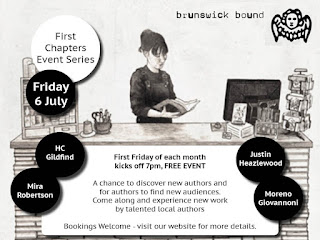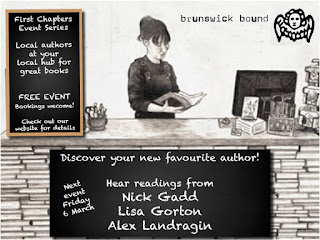First Chapters Q&A with Ruby Murray
Ruby Murray is a writer and journalist whose work has appeared in many publications including The Saturday Paper, Time Out, Meanjin, Dumbo Feather and Griffith Review. She was selected as a SMH Best Young Novelist for her debut novel Running Dogs, which was also shortlisted in the 2013 NSW Premier's Literary Awards.
Ruby will be reading at First Chapters on Friday 3 August from her novel The Biographer's Lover.
We asked Ruby some general bookish questions to get to know her better and here is what she had to say.
Ruby will be reading at First Chapters on Friday 3 August from her novel The Biographer's Lover.
We asked Ruby some general bookish questions to get to know her better and here is what she had to say.
1. Brunswick
Bound has asked you to read a chapter from your published work. Tell us
what we can expect from the chapter you have chosen?
This will be my
first reading from The Biographer’s Lover. The novel hits the shelves that same
week. So I either haven’t decided, or it’s a secret.
The novel is
about the an artist who didn’t go to a war, but still became one of the most famous
war artists in the country; Australia sends official war artists to every war
we fight. It’s a fascinating and strange thing to do.
It will be
really lovely to be reading at Brunswick Bound first - I went to high school
just down the street at Princes Hill in the 90s, and spent years living on
Glenlyon Road.
2. How would
you describe the kind of books that you write?
My first novel,
Running Dogs, was set in Jakarta. The Biographer’s Lover is set in Geelong. In
a way, though, both novels are about Australians and their relationship to
place. We’re so shaped by the environments we live in; they sink into every
part of us. But sometimes it’s easy to forget that we’re also creating the
world around us. There are so many questions at the heart of our experiences of
place: do I belong here? How is the past of this place shaping me, and what do
I owe the future?

3. What was the first book that you read (or had read to you) that left an impression on you?

3. What was the first book that you read (or had read to you) that left an impression on you?
The first
‘grown-up’ book that I read on my own was Finders Keepers by Robin Klein. I
was seven or eight, and I remember feeling as if some new window had just
opened in my head. Klein wrote over seventy books - she’s one of the giants of
Australian children’s literature. Text just started reissuing her work as part
of their Classics series. That series is a real gift to readers.
4. Do you
believe that books should answer life’s big questions?
I’m a
little wary of answers. But I do like good questions.
5. What’s your
go-to solution for writer’s block?
6am.
Bookstores. And Kelvin, High St Melbourne , Australia
6. What is your favourite word or phrase?
“Smeuse.” My
partner just introduced me to the word “smeuse.” It’s a Sussex dialect noun for
“the gap in the base of a hedge made by the regular passage of a small animal.”
I like that at the moment.
Douglas Adams
has a great book of words for things that don’t have words yet, but should. My
favourite one in that is “abilene”, which is “the feeling of the cold side of
the pillow when you turn it over.” But Douglas Adams has a lot of good words.
It’s hard to choose.
(You can check out the rest of Douglas Adams’ words here http://lib.ru/ADAMS/liff.txt_with-big-pictures.html.)
(You can check out the rest of Douglas Adams’ words here http://lib.ru/ADAMS/liff.txt_with-big-pictures.html.)
7. What do you
put down as your occupation when asked?
Depends
who is asking. At the moment, one of my occupations involves six-foot-tall
museums about molluscs and the heat death of the universe. Octopus-sympathist?
Professional boo-maker?
8. What is the
question that you hope never to be asked in an author Q&A?
“Should I
study Creative Writing as an undergrad?”
9. What
question do you hope you will be asked and why?
Who is
the artist you wish everyone knew about? I like to ask that one back, too.
10. Which book
that you have read do you think should be better known or more widely read?
You like this
one too! I’m going to spruik Text’s Classics list again. It’s an incredible way
to deep-dive into Australian lit you might not otherwise have discovered.
Read anything
by Madeleine St John, but especially The Women in Black, which is set in a
department store in Sydney in 1960 and is just delicious. St John was
shortlisted for a Booker in the 1990s.
Harper Collins
also re-released The Pea-Pickers by Eve Langley as part of their Classics
series in the 2000s. The Pea-Pickers was a huge hit when it came out in the
1940s, but it dropped off the radar not long afterwards. It’s
semi-autobiographical, and follows the misadventures of two sisters – Steve and
Blue – who dress up as men to work as agricultural labourers on farms across
Gippsland in the 1920s.
You can visit our website to find out more about the First Chapters event series.
You can visit our website to find out more about the First Chapters event series.




Comments
Post a Comment